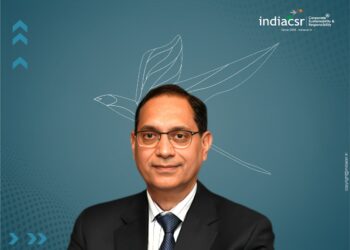New Delhi – Art is a very strong platform for the children to express and empower them and ChildFund India will integrate various art forms in its education initiatives, country director and chief executive officer (CEO), Neelam Makhijani told India CSR.
Makhijani said that it was important for the children to feel safe and express themselves if the country aspires to do well in the overall development index.
The not-for-profit organisation is running its Khilta Bachpan initiative to provide children between 6 and 18 years in underserved communities, access to art education to promote cognitive, social and emotional learning, she said.
The Bengaluru-based NGO is aspiring to impact over 4.5 million people through its child-related programmes by the end of this financial year 2019-20 (Apr-Mar) from the existing numbers at 3 million.
All our programmes are implemented under the umbrella of child protection, she said, adding that the initiatives are designed to be “holistic” to cover not just the children, but their parents, teachers and other stakeholders, including the governments at the Centre and the states.
The NGO has been working in India since 1951 and has a presence in 16 states across the country. It provides “comprehensive” support to the children from their conception until they reach 24 years of age, Makhijani said.
The organisation is supporting over 50 local partners in these 16 states.
ChildFund is currently running three signature programmes – Health and Secure Infants, Educated and Confident Children, Skilled and Informed Youth which it calls Life Stage I, II and III.
Life Stage I
 ChildFund has been emphasising for a greater effort towards the children between 0 and 5 years of age, Makhijani said, calling them most vulnerable.
ChildFund has been emphasising for a greater effort towards the children between 0 and 5 years of age, Makhijani said, calling them most vulnerable.
The CEO called malnutrition as a major hindrance in the overall development of the children. The NGO’s health-based programs are serving children, youth and families have access to quality health and adequate nutrition.
According to the information available on the ChildFund website, over 58% pregnant women in India are anaemic while nearly 47.4% women aged between 20 and 24 are married before reaching the age of 18, worsening the situation. This has led to 52% under-5 mortality in India while child under-nutrition at 42%.
Under the life Stage I, it is also educating parents and caregivers about their role in preserving maternal and child health. In a document published in 2017, the foundation claims to have brought over 40,000 malnourished children at normal indicators.
The NGO is working with over 2,000 early childhood development Centres (ECDC) or Anganwadis across the country, reaching over 150,000 mothers and primary care givers.
Life Stage II
ChildFund has been pitching for early childhood programmes, she said adding that it did not wait for a formal government announcement to do its bit. The NGO is running home and centre-based interventions for the children between 3-5 years.
One of the things the NGO has done is strengthened Anganwadis and caregivers, she said.
Makhijani lauded the draft education policy for proposing to bring early childhood education into the school curriculum. She said that it was long overdue but it is better late than never.
NGO’s education programmes covers more than 1,900 schools in 1,800 villages across 14 states – mostly in tribal, hilly, conflict-affected and remote areas. The initiatives have been impacting over 250,000 school going and 24,000 non-school going children annually, ChildFund’s website claims.
Life Stage III
 ChildFund is helping youth develop critical soft skills to tackle home and work problems. It is also empowering the youth to become self-sustainable through entrepreneurial & vocational training. It is providing support to the students aspiring for higher education to get formal sector jobs.
ChildFund is helping youth develop critical soft skills to tackle home and work problems. It is also empowering the youth to become self-sustainable through entrepreneurial & vocational training. It is providing support to the students aspiring for higher education to get formal sector jobs.
Under the programmes, youth are being educated about their rights and entitlements and how to access the government’s social security schemes and scholarships.
It is also helping children and the youth to practice healthy behaviours; form positive relationships and live free from sexual exploitation and abuse.
Caveats
Makhijani expressed concerns over a bevy of issues including nutrition, education and social security of the children in the country. She said excessive use of pesticide was increasing health concerns for all including the children.
She was also critical about fund allocation for education as a percentage of GDP saying that education cannot be conditional. She also suggested to have provisions for slow learning in the Draft National Education Policy, 2019.
Among other things Makhijani said that the anganwadis need to be strengthened to build a strong foundation for the children.
On the CSR (Corporate Social Responibility), Makhijani said that the corporate sector need to be patient to see the impact as results took time to show.
ChildFund collaborates with business houses to implement its various initiatives.
She however said that most of them (corporates) had “goodwill in their minds”.























